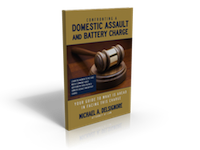What Happens if I am Charged with Assault and Battery on a Family or Household Member in Massachusetts?
Attorney Michael DelSignore at DelSignore Law will help you through the Court Process when you are charged with domestic assault and battery. Attorney DelSignore is passionate about helping you move as quickly as possible through the Court process to get your life back as soon as possible after an arrest. He understands that a criminal charge impacts your job, family life and ability to enjoy your life without worry and anxiety. Our goal at DelSignore Law is to make the process as quick as possible while getting you the best results we can under the circumstances.
- A domestic assault and battery charge will not be dismissed at the first court date or until trial even if the alleged victim does not wish to testify, so there is no quick resolution to this type of criminal charge. This is the most common misconception those charged have is to believe it will be a quick process because the victim, your wife or girlfriend, did not want to see you arrested.
- If you face charges under Massachusetts General Laws Chapter 265 Section 13 for assault and battery on a family or household member, your case will proceed according to the following court process.
You will be arraigned on the charges, meaning that you will be formally advised of the charges. At the arraignment, the court will enter a not guilty plea. In a domestic case, condition could be set at the arraignment. The most common is no abuse of the victim. However, if the victim is in court, the victim may seek a restraining order. Since you are charged with criminal complaint at that time, it is generally unwise to contest the issuance of the 209A order as you would realistically need to testify to have any chance of it not getting issued.
- When you are charged with a criminal accusations, you do not want to make statements about the case that can be used against you.
That is why in most cases, I would advise a client not to contest the 209A order and not to testify at this hearing. It is unlikely a judge would decline to issue the order if the victim testified to the allegations in the 209A affidavit. If you have little or no record, you would not have to post bail. If you have a history of defaulting for court or prior criminal charges, the court may set bail.
What happens if there is a Strangulation charge along with your domestic assault and battery charge
If there is an additional charge of Strangulation in addition to the assault on a family or household member, the Commonwealth could request a Dangerousness hearing to hold you without bail. This is referred to as a 58A hearing. At this hearing, the Commonwealth has to establish that no conditions of release can assure the safety or the public and the victim. This is a high standard to meet. If you are charged with Strangulations, you should have a lawyer for the arraignment.
After the arraignment, the next date is a pretrial hearing. In many cases, the alleged victim will not be on board with the prosecution, meaning they want to have the case dismissed. If this is the case, your charges will not immediately be dismissed. The prosecutor will attempt to prove the case without the alleged victim's cooperation. To do this the prosecutor will need any of the three pieces of evidence:
- 911 call from the victim;
- Admission from you to the offense
- Independent witnesses who can testify to what occurred.
If none of those three pieces of evidence are present, the case is likely to eventually get dismissed. If you have questions about the charge of Assault and Battery on a Family or Household member, call or text Attorney DelSignore to discuss your case at 781-686-5924.
 Attleboro Criminal Lawyer DelSignore Law Home
Attleboro Criminal Lawyer DelSignore Law Home
